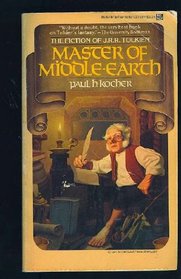This is a decent scholarly study of some of Tolkien's work, albeit published prior to The Silmarillion, which could have filled in a few gaps about the history of Middle-Earth. Where Kocher is able, he sheds light on Tolkien's motives and influences, and references to historical texts. I don't think he is going out of bounds like some critics; he usually cites Tolkien's own statements in support.
There is an in-depth study of some key Middle-Earth peoples, why they act and believe certain ways, and why they were written that way. Another section discusses how The Hobbit did not originally lead into the War of the Ring, with the doom of Numenor, the fate of the High Elves, and all that. The Hobbit was more of a "faery story" for children, which made some pieces fit awkwardly together when Tolkien's 2 massive projects combined into one (the need to write a sequel to The Hobbit, and the sprawling epic of his elves' struggle with Morgoth and Sauron). I haven't usually seen the differences laid out so starkly. The analysis of Aragorn's arc is particularly good, and something to revisit in contrast with the cinematic Aragorn, with increased appreciation for both. There is a close study of what constitutes Sauron's evil, based on values partially informed by Tolkien's religion -- why he valued pity and mercy, for example. The final segment of the book looks at some shorter works of prose and poetry.
There is an in-depth study of some key Middle-Earth peoples, why they act and believe certain ways, and why they were written that way. Another section discusses how The Hobbit did not originally lead into the War of the Ring, with the doom of Numenor, the fate of the High Elves, and all that. The Hobbit was more of a "faery story" for children, which made some pieces fit awkwardly together when Tolkien's 2 massive projects combined into one (the need to write a sequel to The Hobbit, and the sprawling epic of his elves' struggle with Morgoth and Sauron). I haven't usually seen the differences laid out so starkly. The analysis of Aragorn's arc is particularly good, and something to revisit in contrast with the cinematic Aragorn, with increased appreciation for both. There is a close study of what constitutes Sauron's evil, based on values partially informed by Tolkien's religion -- why he valued pity and mercy, for example. The final segment of the book looks at some shorter works of prose and poetry.




